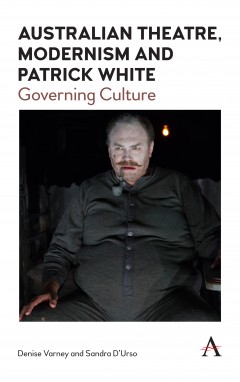Australian Theatre, Modernism and Patrick White
Governing Culture
By Denise Varney & Sandra D'Urso
Other Formats Available:
E-Book- About This Book
- Reviews
- Author Information
- Series
- Table of Contents
- Links
- Podcasts
About This Book
‘Australian Theatre, Modernism and Patrick White’ details the rejection of two Patrick White plays by the Adelaide Festival of Arts in Australia in the early 1960s. In 1961 the board of governors rejected a proposal to include the world premiere of White’s first major play ‘The Ham Funeral’ for the 1962 festival. In 1963 it rejected a proposal to premiere a subsequent play ‘Night on Bald Mountain’ for the 1964 festival. These two rejections were taken up in the press where the former was referred to as the ‘affaire “Ham Funeral”’ and the latter was greeted as ‘here we go again’. ‘Australian Theatre, Modernism and Patrick White’ documents the scandal that followed the board’s rejections of White’s plays, especially as it acted against the advice of its own drama committee and artistic director on both occasions.
Denise Varney and Sandra D’Urso analyze the two events by drawing on the performative behaviour of the board of governors to focus on the question of governance. They shed new light on the cultural politics that surrounded the rejections, arguing that it represents an instance of executive governance of cultural production, in this case theatre and performance. The governing body was a self-appointed private board comprising wealthy men, who were representative of an Adelaide establishment made up of business, farming, newspaper and military interests.
The central argument of ‘Australian Theatre, Modernism and Patrick White’ is that aesthetic modernism in theatre and drama struggled to achieve visibility and acceptability, and was perceived as a threat to the norms and values of early to mid-twentieth-century Australia. The authors argue that when modern drama entered the stage, its preference for aesthetic experimentation over commercial considerations challenged regimes of value based on the popular appeal of musicals, touring productions and overseas imports. The resistance to that prevailing theatre culture and the provocation of Patrick White’s plays provide a prime example of Australia in transition between its colonial heritage and modern future. The 1960s set the scene for the confrontation between modernist experimentation and arts governance, and between aesthetic and commercial values.
Reviews
‘This timely book emphasizes the vitality of Patrick White’s plays and his contribution to current Australian theatre. Although White’s 1973 Nobel Prize was for his novels, Denise Varney and Sandra D’Urso present a compelling and detailed case for the drama’s enduring status. Their thoughtful exploration of the 1960s rejection of White’s drama reveals a radical challenge to types of modernist governance and sovereignty including the Australian separation from British culture.’
—Peta Tait FAHA, Emeritus Professor, Theatre and Drama, HUSS, La Trobe University, Australia
Author Information
Denise Varney is professor of theatre studies and co-director of the Australian Centre in the School of Culture and Communication, University of Melbourne, Australia. She publishes on Australian theatre, feminist and women’s theatre, theatrical modernism, and theatre and ecology.
Sandra D’Urso holds a PhD in performance studies and is currently a researcher at the Australian Centre in the School of Culture and Communication, University of Melbourne, Australia. D’Urso has published in the areas of theatre and politics, performance art in the twenty-first century, Australian aesthetic modernism and the plays of Patrick White, as well as in contemporary Australian poetry.
Series
Anthem Impact
Anthem Studies in Australian Literature and Culture
Anthem Studies in Theatre and Performance
Table of Contents
List of Illustrations; Acknowledgements; Introduction; 1. The Archive, Governance and Sovereignty; 2. ‘Words Fail Me’: The Ham Funeral and the 1962 Adelaide Festival; 3. Night on Bald Mountain and the 1964 Adelaide Festival; 4. The ‘Clowns’ Who ‘Cling to the Past ’: Sovereign Decision and the Practice of Exclusion; 5. The Sovereignty of the Plays and Opportunities for New Publics; Index.
Links
Stay Updated
Information
Latest Tweets



